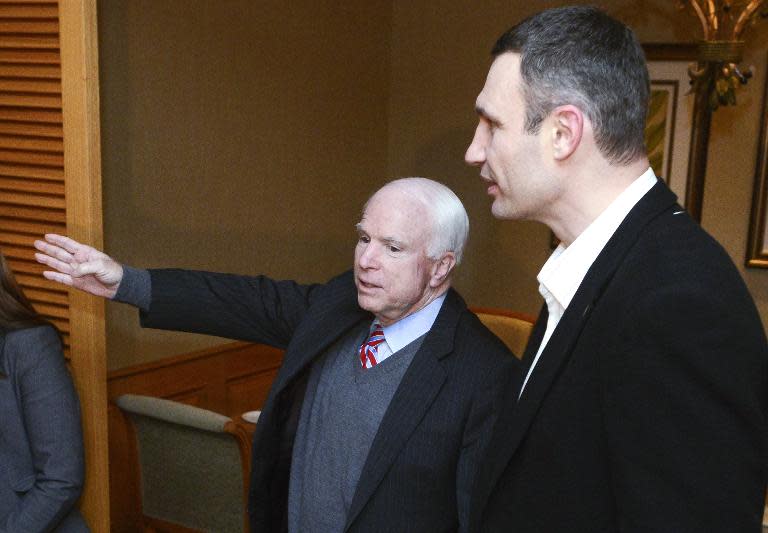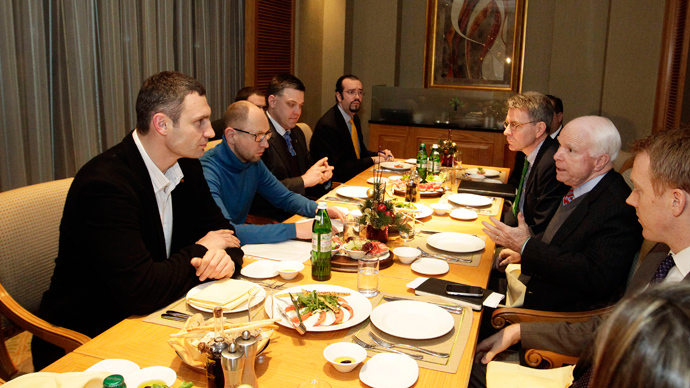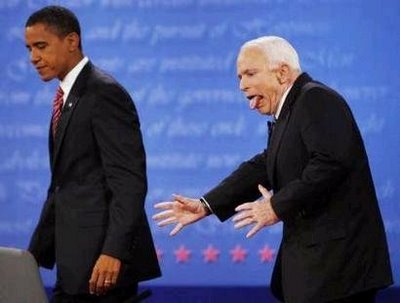Well, now that Vitali is fully on board with McCain and New World Order even the Wall Street Journal suddenly loves him - though they still can't resist getting in a dig at a subject they know nothing about - "His political instincts and style can be compared to his boxing: deliberate and relentless,
if perhaps unimaginative".
----------------------------------------------------
Vitali Klitschko: The Boxer Rebellion
The heavyweight champ and Ukrainian opposition leader on why he's firmly in the corner of the Kiev protesters.
Matthew Kaminski
connect
Updated Dec. 13, 2013 7:52 p.m. ET
Kiev, Ukraine
Around 2 a.m. Wednesday, Vitali Klitschko faced a wall of riot police. The reigning WBC heavyweight champion, six-foot-seven and 250 pounds, was scared. The boys from the Berkut, a special police unit whose name means golden eagle, ignored his pleas to stop and pressed toward an antigovernment camp in Kiev's Independence Square. A similar clash 10 days earlier had turned bloody.
The 42-year-old Mr. Klitschko, who leads an opposition group in parliament, tried to stall the Berkut. When a policeman passed out, Mr. Klitschko asked the Berkut commander to "pause" the advance so the fallen man could be moved to a medical tent. Then Mr. Klitschko directed protesters to form human chains to slow them.
"We won time to build a defense," he says. As word of the attack spread around Kiev, people were roused from bed and headed to reinforce the Maidan, as the square is known. That night, the United States, for the first time since protests began in mid-November, sided clearly with the protesters and leaned on President Viktor Yanukovych to call the Berkut off. He did.
On day 22 of Ukraine's political crisis, the momentum shifted yet again. The bungled attempt to end the upheaval by force rejuvenated the Maidan protesters and moved Mr. Yanukovych to agree to negotiations. On Friday, he met with Mr. Klitschko and other politicians—but offered few concessions. Mr. Klitschko likens negotiations on democratic reform with Mr. Yanukovych to trying to sell a wolf on the health benefits of vegetarianism: "You think the wolf will become a vegetarian? No way!"
Enlarge Image
Ken Fallin
With each passing week, the stakes are rising. The protests started with Mr. Yanukovych's sudden refusal to sign an "association" deal with Europe last month, dashing instead into Russia's arms. Now the opposition is demanding a complete overhaul—in Mr. Klitschko's phrase, "a reboot"—of Ukrainian politics, beginning with early elections for president and parliament. Another large march is scheduled for Sunday. The Yanukovych camp bused in supporters from his base in eastern Ukraine this weekend, prompting opposition concerns about a violent "provocation" that gives the president an excuse to send in the troops.
Speaking at the Maidan on Friday, Mr. Klitschko, the world heavyweight boxing champ and former kickboxer, said anyone who behaves aggressively at Sunday's rally will have to deal with him. Mr. Klitschko's younger brother, Vladimir, holds all the other heavyweight titles and often appears alongside him on the Maidan stage as well.
The square was also the setting of the 2004 Orange Revolution. That uprising began when Russia supported Mr. Yanukovych's attempt to steal a presidential election from Viktor Yushchenko. The Orange crowd prepared for months to challenge him and won that fight. The 2013 "Euro Maidan" is a far more spontaneous phenomenon. Mustafa Nayyem, a Kiev journalist, mobilized the initial protests against the government's EU decision. Opposition parties didn't expect the idea to catch fire; none of their leaders now dares to take credit.
"In 2004, we stayed in the Maidan for Yushchenko and for hope," says Mr. Klitschko, who was in the masses during the Orange Revolution. "Right now everyone stays for himself. They wish to live in a European country, to live with laws and without corruption."
Yet Mr. Klitschko stands out among the opposition, and not just because of his breathtaking physical size. He's the one new face in a crowd of familiar political mediocrities. He has a Ph.D. in physical sciences, hence his nickname, Dr. Ironfist. His considerable fortune earned from boxing reassures people about the sincerity of his commitment to fight corruption and resist temptation. Two failed bids to become the mayor of Kiev since 2005 made for a bumpy start. His oratorical skills are Schwarzeneggerian on good days.
But last year he led a new party called UDAR—the acronym means "punch" in Ukrainian—to a respectable showing in parliamentary elections. He has broken out in the polls, leading Mr. Yanukovych in a head-to-head match, which may come sooner than the presidential election due in early 2015. The government fears him enough that earlier this fall it fiddled with the residency requirement for the presidency, patently to stop him, since he had trained and lived in Germany for most of the previous decade. Mr. Klitschko says the retroactive legal change won't hold up in court, but in another context notes that the judges are in Mr. Yanukovych's pocket.
Getting a fair shot is just one hurdle to a President Ironfist one day. Mr. Klitschko is a relative rookie. His political instincts and style can be compared to his boxing: deliberate and relentless, if perhaps unimaginative. The current crisis has forced him to find a previously unseen talent for improvisation and thinking on the fly.
Most days during this crisis, Mr. Klitschko joins the leaders of a nationalist party and a center-left bloc at a leased trade-unions building off the Maidan. At Thursday's news conference, he spoke first, standing between representatives of those groups—and the middle is where he stands politically as well.
After the news conference, the photographers ignore the other speakers and mob him. He chats with a few journalists in German, one of his four languages. As he struggles to get to another meeting, a young Orthodox priest clasps his broad shoulders, puts a hand on the boxer's head and whispers a blessing in his ear. Priests are a regular feature of the nightly Maidan festivities, which include pop stars performing and regular renditions of the national anthem, "Ukraine Has Not Yet Perished."
Late for a videoconference with the EU's enlargement commissioner, Mr. Klitschko throws on a black hat with ear muffs, walks resolutely through a milling crowd outside on the square and collapses in the back seat of his black Range Rover. "I'm exhausted," he says, coughing. On Monday night, he slept for 90 minutes. He didn't sleep Tuesday night, when the Berkut struck. He has a cold. "The stress is big," he says, "the responsibility huge."
The huge protests on the past two Sundays boosted morale on the Maidan. America's diplomatic intervention changed the dynamic after Wednesday's assault. Secretary of State
John Kerry expressed his "disgust" with the Yanukovych strong-arm methods, and the U.S. threatened sanctions.
"In these hard days, the moral support from friends of democracy is very important," says Mr. Klitschko. While the nationalists in Maidan play up Russian meddling, he is always careful to insist that the fight isn't so much about personalities or geopolitics as about values—democracy, human rights, the rule of law. In short, Europe.
An awareness of Orange Revolution promises dashed hangs over the protests. Mr. Yushchenko was a failed president and lost the office almost four years ago, in a fair election, to his nemesis of 2004. A rising new generation has no memory of the Soviet period but lives under an opaque, occasionally repressive and deeply corrupt post-Soviet political system. Mr. Klitschko bemoans that seven million Ukrainians between age 20 and 35, in a country of 46 million, "the best people with great ideas," have to go abroad to seek work.
The former Soviet Union has few examples of good governance. Mr. Klitschko insists that Ukraine can change with sufficient political will and cites Georgia as proof. He visited the small Caucasus country in 2006, a few years after a new pro-Western government took power, and returned last year. "I was shocked!" he says. "Six years, huge difference. We're from the same system, from the Soviet Union. We have almost the same mentality." His idea for "reboot" comes from Georgia's overnight decision to fire all the traffic cops, clean out the judiciary and open the economy to kill a culture of corruption.
First things first. Mr. Yanukovych appears to be deploying his own version of Muhammad Ali's rope-a-dope tactic, stalling for time and waiting for his opponent to tire or make a mistake. He promised this week to revive the EU trade deal—even as he negotiates an economic package with Moscow. On Tuesday, Mr. Yanukovych meets with
Vladimir Putin, which could add another twist to this saga.
The path to victory for the Maidan protesters is hard. In addition to sustained public protests, they need to hasten defections from the president's allies, which have slowed. A call for a general strike would mark an escalation, but won't work unless the powerful oligarchs in the east let their workers walk. These tycoons financed Mr. Yanukovych's campaign. Though sour about the rise of a competing business clan around the president called the "family," the oligarchs haven't openly opposed him. Mr. Klitschko says contacts with them are only sporadic. "It's not easy," he says.
Seen from Kiev, Euro Maidan is a national rite of passage in progress. Independence in 1991 and the Orange Revolution were the other moments when Ukrainians—for so long considered by their former imperial masters in Moscow as "Little Russians" and southern bumpkins—stood up to assert a unique identity. But there's no consensus among Ukrainians about the nature of that identity.
The Maidan is dominated by Ukrainian speakers from Kiev and the western parts of the country, which were only incorporated into the Soviet Union from Poland in 1939. Yanukovych Land to the east is Russian-speaking and culturally more Soviet. Attempts in recent weeks to capitalize on the president's unpopularity nationwide and replicate the Euro Maidan in those industrial towns weren't successful. The fear that Moscow could stir up trouble in the east has been a permanent feature of political life in Kiev since independence.
"Right now is a very dangerous moment," says Mr. Klitschko. Russian state-run media dominate in the east and portray the EU as morally decadent, overrun by homosexuals and financially bankrupt. "We know how propaganda works," the boxer says. "It comes from the Soviet Union—it's brainwashing."
Mr. Klitschko's own not atypical Ukrainian story shows how blurry these linguistic and cultural faultlines can be. Born in the Kyrgyz Republic, he grew up a Soviet military brat. His late father, an air force general, was stationed in Central Asia and Czechoslovakia. "I can't say I'm against Russia. My mom is Russian, my father Ukrainian," Mr. Klitschko says. "I grew up with Russian culture. I speak Russian. I feel comfortable in Russia. It's the good thing we got from the Soviet Union; no matter what nationality, I am multicultural."
Going into politics, Mr. Klitschko hired a tutor to help improve his limited command of Ukrainian. He has committed a couple of linguistic gaffes but sticks to Ukrainian in public. He avoids prolonged discussion of Ukrainian identity, which borders on obsession for the nationalists, cutting it off with, "You can't go forward while turning your head to the past."
Comparisons between his boxing career and political life inevitably come up. Two years ago in New York, Mr. Klitschko told me that boxing seemed easier than Ukrainian politics, which he called "a fight without rules." Later on Thursday, driving to his party office, he notes that sports taught him to "always to look forward and not allow yourself to be turned to the right or left. In politics, people are always trying to stop you." In both endeavors "you have to have a strategy," he adds, "even in boxing you have to think two steps ahead."
At another stop on Thursday, asked if his boxing career is over—he holds a heavyweight title but hasn't fought since last year—Mr. Klitschko shoots back the wink of a showman, says "this is my most important fight," and jumps out of the car.
Mr. Kaminski is a member of the Journal's editorial board
http://online.wsj.com/news/articles/SB10001424052702303293604579256481340901294





.jpg)
.jpg)

